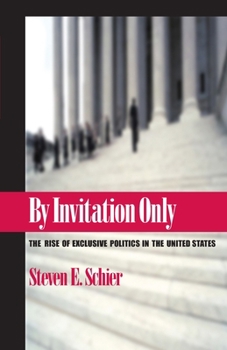By Invitation Only
Select Format
Select Condition 
Book Overview
By Invitation Only examines the shift in the United States from mobilization (the partisan method of stimulating very high voter turnout in elections) to activation--the political variant of "niche marketing." This more contemporary method that parties, interest groups, and candidates employ induces particular, finely targeted portions of the public to become active in elections, demonstrations, and lobbying. Traditional partisan mobilization was a crude tool, operating through personal and print communication. It involved broad appeals often carried through personal conversation with local party workers, or through America's then highly partisan press. Political mobilization predominated during election campaigns of the late 19th and early 20th centuries, a period of peak party power. The shift from mobilization to activation allows organizers to mobilize strategic minorities while cloaking the effort in a misleading guise of popular rule. The vogue of participation is that all should get involved. In fact, as Schier illustrates, the process encourages only a strategically selected few to vote in elections or petition government for their interests. The result is a decline of majority rule in American politics. A must-read for anyone concerned with politics in America.
Format:Paperback
Language:English
ISBN:0822957124
ISBN13:9780822957126
Release Date:January 2000
Publisher:University of Pittsburgh Press
Length:264 Pages
Weight:0.70 lbs.
Dimensions:0.6" x 5.5" x 8.5"
Customer Reviews
1 rating
Basically gets it right
Published by Thriftbooks.com User , 23 years ago
This book is too good just for academics and pundits. For anyone concerned about declining rates of voter participation in America, this is must-read stuff. Schier is most provocative in how he argues that fundamentally our parties have too FEW resources, not too many. In particular, ever since parties lost the patronage and their ability to "mobilize" large swathes of the American electorate, more and more Americans have been dropping out because they are unwilling / unable to pay the costs of participation. The tradeoff, of course, which Schier could say more about, is that for those who DO participate, the ability to democratically influence policy has probably never been higher. Sure, lots of people voted in the 19th century, but their choices and the amount of policy they could really influence were very constricted. Today, more freedom - but also more responsibility, which creates a systematic bias in favor of the wealthy, the more-educated and the elderly. Schier doesn't really have a solution to this tradeoff (is there one?) but he sure nails the problem. The historical angle lends a fresh perspective to some familiar-sounding arguments. This book is particularly good read in conjunction with Michael McGerr's _The Decline of Popular Politics_ and Jonathan Rauch's _Government's End_.





